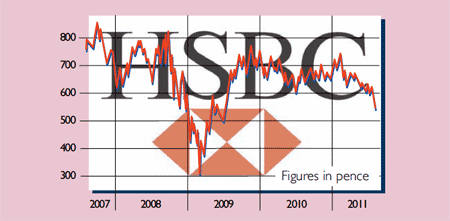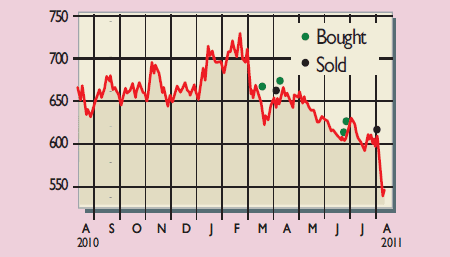Shares in focus: HSBC is pinning its hopes on Asia
HSBC has weathered the financial crisis better than many global banks. And on paper, the shares look cheap. So, should you buy HSBC shares? Phil Oakley reports.
Get the latest financial news, insights and expert analysis from our award-winning MoneyWeek team, to help you understand what really matters when it comes to your finances.
You are now subscribed
Your newsletter sign-up was successful
Want to add more newsletters?

Twice daily
MoneyWeek
Get the latest financial news, insights and expert analysis from our award-winning MoneyWeek team, to help you understand what really matters when it comes to your finances.

Four times a week
Look After My Bills
Sign up to our free money-saving newsletter, filled with the latest news and expert advice to help you find the best tips and deals for managing your bills. Start saving today!
What is HSBC?
HSBC (HSBA) is one of the world's largest banking and financial services companies. It has around 89 million customers in 87 countries. Its activities are split into two distinct areas: retail banking and wealth management, and commercial banking. The group generates 60% of its profits from the Asia-Pacific region, 19% from Europe, 10% from Latin America, 6% from the Middle East and 5% from North America.
What's the company's history?
It was founded in 1865 as the Hong Kong and Shanghai Banking Corporation Ltd to finance trade between Europe, India and China. HSBC remained largely an Asian regional bank until the 1980s, when it purchased the Marine Midland Bank in America. In 1992, it bought Midland Bank in Britain. During the last fifteen years it has concentrated on building its presence in the emerging markets of Asia, South America and the Middle East. Its acquisition of Household Finance Corporation a large sub-prime lender in the States in 2002 proved to be a strategic mistake. Still, HSBC weathered the 2008 financial crisis better than most global banks. Its financial position was considerably strengthened after a record UK rights issue of £12.5bn in 2009.
Who runs HSBC?
Stuart Gulliver joined HSBC in 1980 and has been CEO since January 2011, having previously been head of the global banking and markets division (he was paid £3.9m in 2010). Former group finance director Douglas Flint is chairman.
MoneyWeek
Subscribe to MoneyWeek today and get your first six magazine issues absolutely FREE

Sign up to Money Morning
Don't miss the latest investment and personal finances news, market analysis, plus money-saving tips with our free twice-daily newsletter
Don't miss the latest investment and personal finances news, market analysis, plus money-saving tips with our free twice-daily newsletter
How is trading?
First-half results for 2011 saw pre-tax profits increase by 3% to $11.47bn, but a large reduction in tax expenses led to earnings per share (EPS) increasing by 34% to $0.51. Dividends per share increased by 12.5% to $0.18. Both the retail banking and wealth management division and commercial banking delivered good profit growth, although investment banking profits fell. However, costs as a percentage of income increased from 50.9% to 57.5%. The core tier 1 ratio a measure of financial strength rose from 10.5% to 10.8%, while return on equity increased from 10.4% to 12.3%.
What's the outlook for HSBC?
If Asian economies continue to prosper then HSBC should do well, but problems in European economies are a concern. Banks also face tougher regulation and will have to hold more capital against potential losses. This will put pressure on shareholders' returns. CEO Stuart Gulliver has a bold strategy: HSBC's capital will be focused on emerging markets and wealth management while $2.5bn-$3.5bn of costs will be slashed. The aim is for returns on equity to hit 12%-15% over the economic cycle.
The analysts
Of the 39 analysts surveyed by Bloomberg, 24 say "Buy", 13 "Hold" and two "Sell". The average price target is 753p 46% above the current price. The most bullish is Goldman Sachs, with a 920p price target. Alpha Value's price target of 600p is most bearish. Our view: although HSBC now trades below its book value, economic and regulatory challenges contain lots of risks. Safer yields may be found elsewhere.
The numbers

Stockmarket code: HSBA
Share price 514p
Market cap: £91.7bn
Net assets (June 2011) $168bn
P/E (current year estimate) 8.9
Yield (prospective) 4.30%
Directors' dealings

There has been steady two-way trading by directors during the last six months, which mainly relates to the vesting of share plans. HSBC sets ownership targets for directors. So, for example, the CEO must hold at least 600,000 shares in the company, while the finance director must hold at least 200,000. All directors comfortably exceeded their share ownership targets at 31 December 2010. The following table shows major share sales on 28 February 2011.
Director and shares sold
D Flint: 105,162
S Gulliver: 644,964
Get the latest financial news, insights and expert analysis from our award-winning MoneyWeek team, to help you understand what really matters when it comes to your finances.
Phil spent 13 years as an investment analyst for both stockbroking and fund management companies.
-
 Should you buy an active ETF?
Should you buy an active ETF?ETFs are often mischaracterised as passive products, but they can be a convenient way to add active management to your portfolio
-
 Power up your pension before 5 April – easy ways to save before the tax year end
Power up your pension before 5 April – easy ways to save before the tax year endWith the end of the tax year looming, pension savers currently have a window to review and maximise what’s going into their retirement funds – we look at how